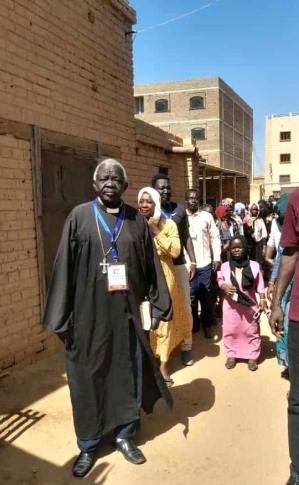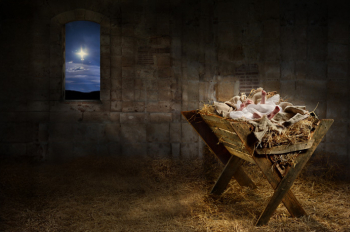
In an apparent attempt by a Muslim businessman in Sudan to seize church property, police on Tuesday evening (Oct. 28) arrested and jailed overnight a pastor in River Nile state, sources said.
Two police officers from the state Department of Criminal Investigation arrived at the home of the Rev. Daud Fudul Kachu of the Sudan Presbyterian Evangelical Church (SPEC) in Atbara at about 6 p.m. and presented him with an arrest warrant, a church member said.
When congregation members said he needed to speak with the church attorney first, the officers initially feigned understanding, but two other policemen hiding behind the church building appeared and forced Pastor Kachu into a vehicle, the church member said.
They took him to the Atbara police station, where he was jailed. An intensive interrogation followed on Wednesday morning (Oct. 29), and police conveyed the Muslim businessman’s demand that he had 30 days to vacate the church premises, the member said.
“They [police officers] told us, ‘The law is above your religion,’” the church member told Morning Star News by phone from the police station.
Police demanded the pastor sign a document stipulating that he would no longer object to anyone trying to seize the church property, but he refused, church members said.
Pastor Kachu, who has led the church for 30 years, was initially denied bail but police later released him after intervention by the church attorney. Police released the church leader without any bail requirement on Wednesday (Oct. 29) shortly before 1 p.m.
“The pastor has been released now,” the church member told Morning Star News.
Officers were reportedly seeking to question church council members named by the Muslim businessman.
A battle over church assets started several years ago, with the government favoring Muslim business interests taking over assets owned by the SPEC and other churches in Khartoum and in other states of Sudan.
A years-long Islamist attempt to seize a Christian school in Sudan continued in September even as people displaced by war have taken refuge in the facility, sources said. An Islamic business interest sent three Muslims who forcefully entered the embattled Evangelical School of Sudan, in Omdurman across the Nile River from Khartoum, on Sept. 3 and threatened hundreds of mostly Christian people displaced by internal war, telling them to leave the compound, said an area church leader.
The intruders made their way to the office of the headmaster of the school, which belongs to the SPEC, and broke the office door, the church leader said. Without giving a deadline, the intruders threatened to take the facility by force, he said.
The institution suffered numerousattacks during the regime of deposed President Omar al Bashir, mainly raids by supporters of the Muslim businessman who has sought to seize the land by force accompanied by police.
Sudan is 93 percent Muslim, with adherents of ethnic traditional religion 4.3 percent of the population, while Christians constitute 2.3 percent, according to Joshua Project.
Conditions in Sudan have worsened since civil war that broke out between the paramilitary Rapid Support Forces (RSF) and the Sudanese Armed Forces (SAF) in April 2023. Sudan registered increases in the number of Christians killed and sexually assaulted and Christian homes and businesses attacked, according to Open Doors’ 2025 World Watch List (WWL) report.
“Christians of all backgrounds are trapped in the chaos, unable to flee. Churches are shelled, looted and occupied by the warring parties,” the report stated.
Both the RSF and the SAF are Islamist forces that have attacked displaced Christians on accusations of supporting the other’s combatants.
The conflict between the RSF and the SAF, which had shared military rule in Sudan following an October 2021 coup, has terrorized civilians in Khartoum and elsewhere, killing tens of thousands and displacing more than 11.9 million people within and beyond Sudan’ borders, according to the U.N. Commissioner for Human Rights (UNCHR).
The SAF’s Gen. Abdelfattah al-Burhan and his then-vice president, RSF leader Mohamed Hamdan Dagalo, were in power when civilian parties in March 2023 agreed on a framework to re-establish a democratic transition the next month, but disagreements over military structure torpedoed final approval.
Burhan sought to place the RSF – a paramilitary outfit with roots in the Janjaweed militias that had helped former strongman Bashir put down rebels – under the regular army’s control within two years, while Dagolo would accept integration within nothing fewer than 10 years.
Both military leaders have Islamist backgrounds while trying to portray themselves to the international community as pro-democracy advocates of religious freedom.
Sudan was ranked No. 5 among the 50 countries where it is most difficult to be a Christian in Open Doors’ 2025 World Watch List (WWL), down from No. 8 the prior year. Sudan had dropped out of the top 10 of the WWL list for the first time in six years when it first ranked No. 13 in 2021.
Following two years of advances in religious freedom in Sudan after the end of the Islamist dictatorship under Bashir in 2019, the specter of state-sponsored persecution returned with the military coup of Oct. 25, 2021. After Bashir was ousted from 30 years of power in April 2019, the transitional civilian-military government had managed to undo some sharia (Islamic law) provisions. It outlawed the labeling of any religious group “infidels” and thus effectively rescinded apostasy laws that made leaving Islam punishable by death.
With the Oct. 25, 2021 coup, Christians in Sudan feared the return of the most repressive and harsh aspects of Islamic law.
The U.S. State Department in 2019 removed Sudan from the list of Countries of Particular Concern (CPC) that engage in or tolerate “systematic, ongoing and egregious violations of religious freedom” and upgraded it to a watch list. Sudan had previously been designated as a CPC from 1999 to 2018.
In December 2020, the State Department removed Sudan from its Special Watch List.





